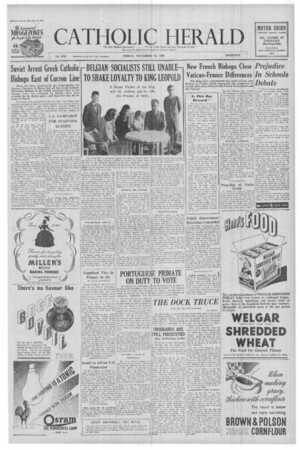Page 1, 16th November 1945
Page 1

Report an error
Noticed an error on this page?If you've noticed an error in this article please click here to report it.
Tags
Share
Related articles
King Leopold Sees M. Spaak
King Leopold's Birthday To Be Quietly Celebrated
King Leopold, A Model Catholic Monarch, Stands Revealed...
King Leopold's Vindication Messages To British Army That...
King Leopold
BELGIAN SOCIALISTS STILL UNABLE
TO SHAKE LOYALTY TO KING LEOPOLD
The rising tide of animosity against the Belgian Government's persecution of King Leopold reached its climax this week, when the visit of Mr. Winston Churchill to Brussels, November 15, was made an excuse for the banning of all demonstrations on Leopold's behalf on the occasion of the Fete du Roi, or Fete de la Dynastic.
which falls on the same date.
Last week his positiOn was debated in the Belgian Senate. On
Friday M. Speak, Foreign Minister, was :old by a representative of the four parties supporting the Government that they were anxious about the strorsg agitations and propaganda in favour of the King that was being carried on in the aemy by officers and N.C.O.'s. They also protested against the increasing number of demonstrations which are being held by the King's supporters.
In fact, they, in their protestations. supported clearly the reports which have been published for the last three months in THE CATHOLIC FICSALD to the effect that the Belgian people are completely Unaffected in their loyalty to the King by the Governmental pressure which has been brought to bear upon him, and by the unscrupulous and dishonest propaganda attacks which have been made
on the dynasty by the Left. .
FULL-BLOODED ASSAULT
The Debate opened on Saturday with a full-blooded assault on the Government case by the Catholic deputies, M. Cools, M. Ronse and M, Brifaut.
Ronse upheld the central point of the King's defenders that the Government's actions throughout had been unconstitutional. The King was the symbol of Belgian unity. He had prevented the country from being divided into two blocs The Government had managed to do what the Germans couldn't do. Divide Belgium on the question of the monarch.
M. Brifaut recalled the example of the King's father. Albert, the hero of 'the last war, who had held fast to his armies in the face of German invasion. So also had Leopold It was natural that the King should have gone to
Berchtesgaden; his army had been defeated. When the King was accused :he Government could never produce more than one witness. The allegations of a member ot the King's household that the K ing intended to have himself taken away by the Germane were the allegrations of one who was a Judas.
DIVIDING THE COUNTRY'
M. Cools accused the Government of dividing the country hy making anonymous and damaging insinuations. creating a condition in which the King's supporters might be unjustly
suspected. " Is it the King or he Premier who told the truth about the
Bere.htesgaden Intel view ? he demanded. The Premier's behaviour was odious: he had destroyed his place in the G overnmens
After a recess M. Brifaut produced evidence that the Belgian Government of 1940 had accepted defeat and left the King to stand between the people and the Germans. He demanded that the pertinent documents clarifying the 1940 position be placed at the disposal of the people in a White Paper.
M. Vermeylen. Socialist, replying to these ciiticisms, dedicated the first points of his talk to an explanation of the banning of Le Quotidien. He said this incident was being exploited by the Catholics for political reasons, The Catholics accused the Government of being afraid to publish the truth. This was true. The Government was afraid Co publish certain true facts because they would be detrimental to the country.
He then went on to criticise the King because lie had not issued a proclamation (while he was a prisoner of the Germans), calling on the Belgians to tight the occupying Powers. The Belgian Goveinment in London had no support from the King (during the years when the King was imprisoned).
He accused 'the King of being passively neutral, after his defeat and capture in the held and alleged that on its return to Brussels the London Government (winch was subsequently attacked and brought down by the Government now in office) had discovered documents which had demanded an apology from them because they had infringed the limits of dual Government power-the King s and the administration s.
Increasing restrictions on the political expressions of citizens are now repotted from Belgium. Last week 'a burgomaster in Limburg was dismissed for criticising the Government. When a ' meeting of Royalists was announced for Ostend on Sunday the burgomaster at once announced that all meetings ol ITiore than four or Jive persons were banned and a polite interdiction against this particulai meeting was taken out.
CONGR ATULATIONS
Le Quotidien reports this week that a telegram of congratulations was received by King Leopold from King George on November 3 his birthday. The paper adds that Sir John Monk, Marshal of the Diplomatic Corps, was asked by King George to call at the Belgian Embassy and convey the British King's congratulations to M. Cartier de Marchienne. Belgian Ambassador to the Court of St. James.
Mgr. Griffin, Archbishop of Westminster, stated on Saturday. that after visiting several European countries. that the Belgian people would acclaim the realm of the King. In nearly every house and shop a picture of the King could be seen.
The former American Ambassador to Belgium, Mr. Gibson, in a letter to the New York Times, this week criticises the present campaign against the Belgian King who. he says, " will emerge as one of the great heroic figures of the war."
blog comments powered by Disqus







